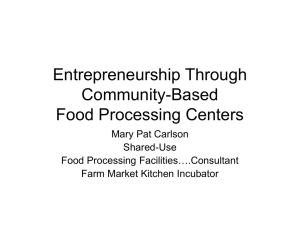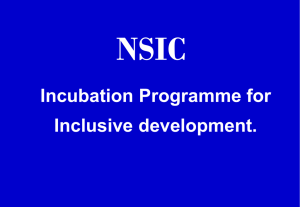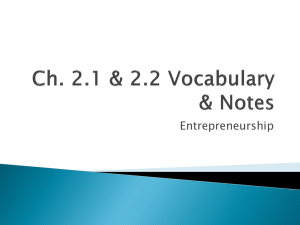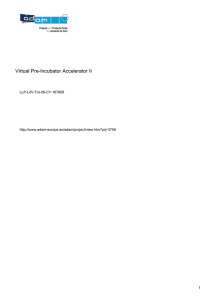Virtual Pre-Incubator Accelerator
advertisement
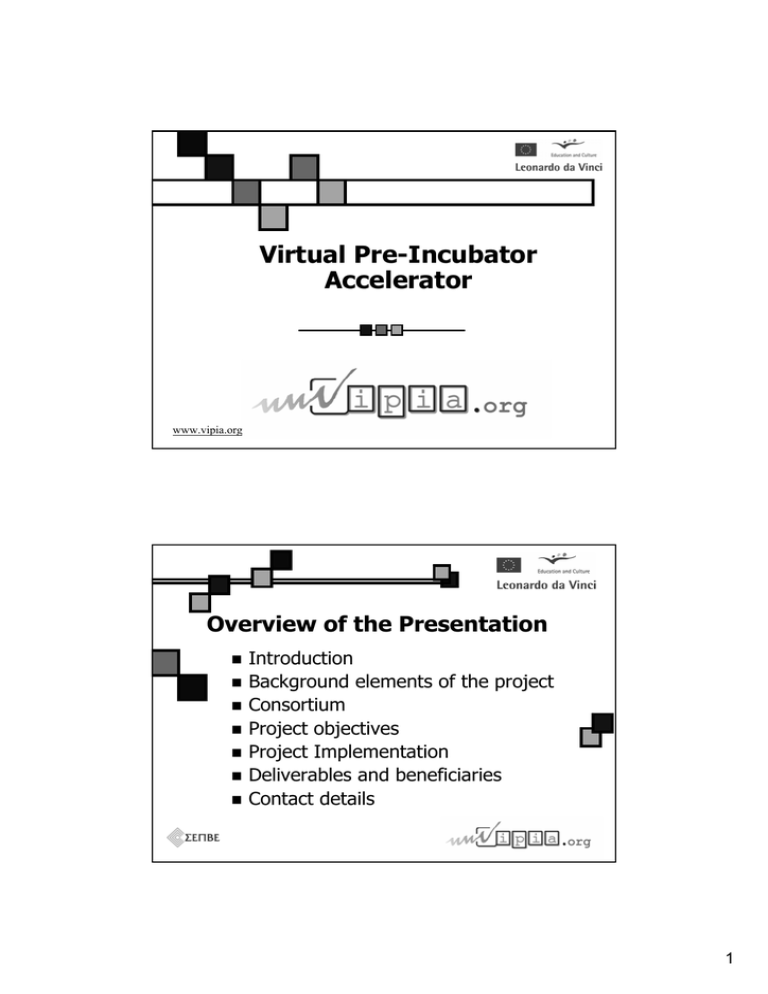
Virtual Pre-Incubator Accelerator www.vipia.org Overview of the Presentation Introduction Background elements of the project Consortium Project objectives Project Implementation Deliverables and beneficiaries Contact details 1 Introduction The Virtual Pre-Incubator Accelerator (ViPiA) project is a two-year project running until January 2007. It is part funded by the European Commission (Leonardo da Vinci programme, phase II) and has partners in Belgium, Greece, Spain, Netherlands and Cyprus. Our aim is to create a training package; addressing “wouldbe” entrepreneurs in order to assist them develop their venture concepts to a level that they are presentable/attractive to potential angel investors, incubators and other support institutions. Background Elements of the project It is widely accepted within the EU that future prosperity hinges on the creation of vibrant indigenous businesses deeply rooted in the local economy. The Entrepreneurship in Europe Green Paper recognises that the starting point must be the creation of a more entrepreneurial society. Matched against the EU's competitor economies (i.e. US), relatively few people in Europe start businesses, only a minority of which grow and most of those that do so, only expand slowly. One of the key determinants for the growth of an entrepreneurial society, is the existence of effective support mechanisms to empower private initiatives and nurture new enterprises on their way to sustainability. There are many such support mechanisms available to small firms in their earliest stages of development, the prime one being “business incubation”. 2 Background Elements of the project However, assuming that effective incubation services are widely available to start-ups within the EU, there is still a wide gap between the conception of an entrepreneurial plan or idea and the formation of a start-up business that has the credentials to qualify for incubation. The virtual pre-incubator will be created with the purpose of providing an environment where "would-be" entrepreneurs with a seemingly feasible business idea, will be subject to a learning process that will help them acquire the diverse tools and skills needed to transform their idea into a viable business start-up. Project Partnership First Elements Ventures Ltd. (Cyprus) SEPVE, the Association of Information Technology Companies of Northern Greece (Greece) EBN (Belgium) IASP (Spain) Atlantis Consulting S.A. (Greece) University of Macedonia of Economic and Social Sciences (Greece) Technopolis Thessalonikis S.A. (Greece) The International University of Entrepreneurship (Netherlands) BIC Netherlands (Netherlands) 3 Project Objectives The virtual pre-incubator will provide, in the first stage, effective IT-enabled business e-coaching/training to hundreds of "would-be" entrepreneurs and in the second stage, real-life exposure and interaction with select business incubators to, help them transit seamlessly from the preincubation phase to the incubation one. The ultimate objective is to strengthen business creation and levels of sustainability in the EU, through an increase in the quantity and quality of eligible incubatees. The project aims to create better opportunities for easy and low cost access to continued professional training and advisory services for a specific target group including students, graduates, and people at research and education agencies, inventors and women. Project Implementation Phases An integrated approach will be used in two stages: • Pre-incubation stage • Incubation stage In the first stage, the early phase of development, the 'potential entrepreneurs' can visit the project site as often as they wish. Self - paced resources will be provided such as: A training manual that will include modules such as: - Team & Management Risk (management/ HR development) - Innovation commercialisation (Marketability Risk) - Innovation financing (what investors want, Financial Risk) - Intellectual property (IP) management strategies (Production Risk) - Idea evaluation process - Easy-to-learn virtual environment (forum) for exchange of experience - Business plan template and hints - Directory of best practices 4 Project Implementation Phases Pertaining to the second stage, the project incorporates visiting schemes to the partners’ business incubators where "would-be" entrepreneurs can experience firsthand the concept and practice of business incubation, how it operates and how it can actually help them to turn their business idea into practical reality. Furthermore, the visiting scheme would allow "would-be" entrepreneurs to exchange experiences and ideas with entrepreneurs already housed in incubators. The developed training material will be tested through two pilot courses (one pilot course for the foundation and one for the advance level participants) that will take place in one of the partner's country. After the finalization of the e-learning platform pilot course participants will test and evaluate the platform based on their live seminar participation experience Project Deliverables and Beneficiaries Expected results: Methodologies, models, guidelines, curricula. Products, software, and tools. Materials, workshops, seminars. Visiting Schemes. • • • • Potential beneficiaries: Inventors, R&D institutes, young entrepreneurs working in high-technology business with skills to develop new technologies and will to apply research activities’ results are the main target group. Students and graduates with good technical skills and scientific results from their research work • • 5 For further information about the project, please contact: First Elements Ventures Panayiotis Pastos & Pantelis Dimitriou Tel. +357 22875710 Fax +377 22757080 Email: ppastos@firstelements.com.cy & pdimitriou@firstelements.com.cy Project URL: www.VIPIA.org THANK YOU 6
